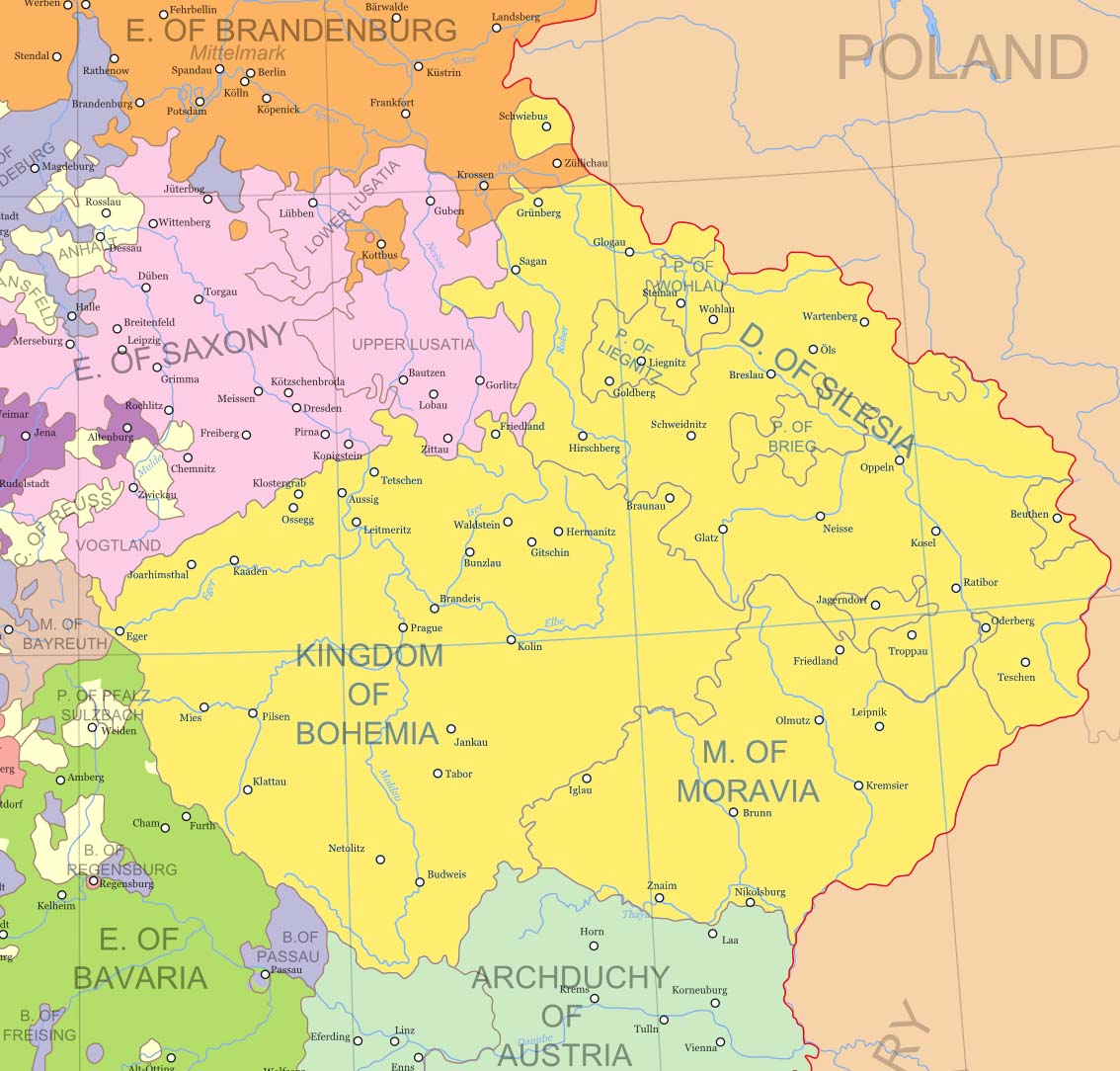
Map showing the Crown of Bohemia in 1648. (Source of image: Wikimedia Commons)
This week’s publications in EMLO are focussed firmly around ongoing work orchestrated in ‘the Lands of the Bohemian Crown’ and we see the correspondence of Amandus Polanus of Polansdorf join the union catalogue, together with an ‘omnium gatherum’ of the correspondence of late-sixteenth and early seventeenth century Czech students who travelled to the Protestant learned centres of western Europe.
Amandus Polanus, the Silesian-born theologian, studied in Troppau [Opava], Breslau [Wroclaw; Vratislav], Tübingen, Basel, and Geneva, before settling as professor of Old Testament in Basel. The calendar of his correspondence has been assembled thus far under the aegis of a project established in Prague, ‘Correspondence networks between Central and Western Europe: From Comenius and Kircher to Hartlib and Oldenburg’, which was funded by the Czech Academy of Sciences for three years from mid-2012 to support cooperation between the Institute of Philosophy at the Czech Academy of Sciences and the University of Oxford. Members of the project’s team have investigated the relationship of the Unity of Brethren to the Reformed centres of education in the Empire and Switzerland, the connection of Jan Amos Comenius [Komenský] and his circle to the large international communication networks of the seventeenth century (in particular to the circle of Samuel Hartlib), the overlaps between Jesuit mathematicians in Prague and the correspondence networks of Athanasius Kircher and Christiaan Huygens, and contacts of scholars from Silesia with the Academia naturae curiosorum and the Royal Society. Funding from this project has enabled scholars working in these areas to be brought together and a series of workshops, meetings, and talks were conducted in Oxford, Prague, and Vienna at which new research topics were discussed and presented. Two exemplary workshops were organized in Prague: ‘Databases in Early Modern Research: Tracing People, Books and Letters’ took place in September 2013 and was followed a year later with ‘The Practice of Scholarly Communication: Correspondence Networks Between Central and Western Europe, 1550–1700’. A volume, edited by Vladimír Urbánek and Iva Lelková and based on reworked contributions from the latter workshop, as well as newly commissioned papers, is in preparation currently for publication next year with Ashgate. The project also funded extensive research in the archives and libraries in Wrocław, Berlin, Budapest, Leipzig, Halle an der Saale, Herrnhut, Oxford, London, Basel, Zürich, Olomouc, and Brno, and a number of hitherto unpublished letters from Comenius’s correspondence have been discovered and added to the catalogue in EMLO. Together with Czech participation in the European COST Action Reassembling the Republic of Letters, this project has enabled continuation of the fruitful collaboration between the Department of Comenius Studies and Early Modern Intellectual History of the Institute of Philosophy, Czech Academy of Sciences and our own Cultures of Knowledge here at Oxford.
In addition to the Polanus catalogue, for which metadata of the letters from the Swiss archives (Universitätsbibliothek Basel, Zentralbibliothek Zürich, and Staatsarchiv des Kantons Zürich) is published this week with further letters from a number of Czech archives to be added in the near future, a catalogue has been compiled of the correspondence of the physician Philipp Jacob Sachs von Lewenheimb, and this was published in EMLO last year. Meanwhile, ever eager to pull its weight, Cultures of Knowledge has rolled up its proverbial sleeves and, in partnership with our Prague colleagues and the Digital Library of the Faculty of Arts, Masaryk University, Brno, has assembled a calendar taken from František Hrubý’s 1970 edition of correspondence of Bohemian and Moravian students who studied at Protestant universities in Western Europe. It is a truly fascinating selection of letters and, all in all, these publications in EMLO and the work of our partners in Prague are a cause for celebration. We hope very much you will explore in EMLO some of the research being headed by Vladimír Urbánek at the Czech Academy of Sciences and enjoy the fruits of an invaluable collaboration.
